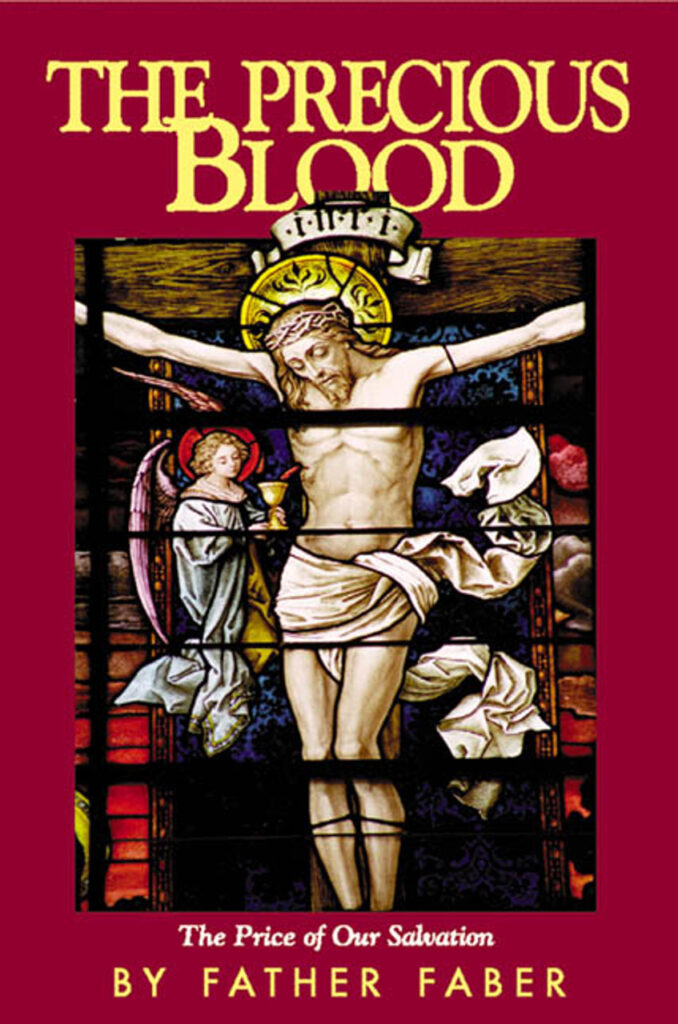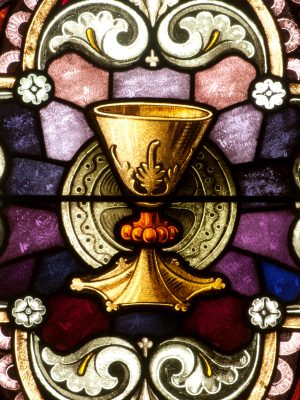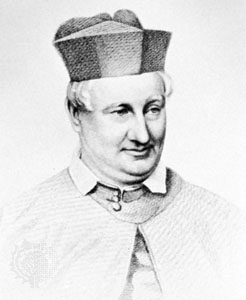Salvation! What music is there in that word – music that never tires but is always new, that always rouses yet always rests us! It holds in itself all that our hearts would say. It is sweet vigor to us in the morning, and in the evening it is contented peace. It is a song that is always singing itself deep down in the delighted soul. Angelic ears are ravished by it up in heaven; and our Eternal Father himself listens to it with adorable complacency. It is sweet even to him out of whose mind is the music of a thousand worlds.
To be saved! What is it to be saved? Who can tell? Eye has not seen, nor ear heard. It is a rescue, and from such a shipwreck. It is a rest, and in such an unimaginable home. It is to lie down forever in the bosom of God in an endless rapture of insatiable contentment.
“Thou shalt call his name Jesus; for he shall save his people from their sins.” Who else but Jesus can do this, and what else even from him do we require but this? For in this lie all things which we can desire. Of all miseries the bondage of sin is the most miserable. It is worse than sorrow, worse than pain. It is such a ruin that no other ruin is like unto it. It troubles all the peace of life. It turns sunshine into darkness. It embitters all pleasant fountains, and poisons the very blessings of God which should have been for our healing. It doubles the burdens of life, which are heavy enough already. It makes death a terror and a torture, and the eternity beyond the grave an infinite and intolerable blackness.
Alas! We have felt the weightiness of sin, and know that there is nothing like it. Life has brought many sorrows to us, and many fears. Our hearts have ached a thousands times. Tears have flowed. Sleep has fled. Food has been nauseous to us, even when our weakness craved for it. But never have we felt any thing like the dead weight of mortal sin. What then must a life of such sins be? What must be a death in sin? What of the irrevocable eternity of unretracted sin?
From all this horror whither shall we look for deliverance? Not to ourselves; for we know the practical infinity of our weakness, and the incorrigible vitality of our corruption. Not to any earthly power; for it has no jurisdiction here. Not to philosophy, literature, or science; for in this case they are but sorry and unhelpful matters. Not to any saint, however holy, nor to any angel, however mighty; for the least sin is a bigger mountain that they have faculties to move. Not to the crowned queen of God’s creation, the glorious and the sinless Mary; for even her holiness cannot satisfy for sin, not the whiteness of her purity take out its deadly stain.
Neither may we look for deliverance direct from the patience and compassion of God himself; for in the abysses of his wisdom it has been decreed, that without shedding of blood there shall be no remission of sin. It is from the Precious Blood of Jesus Christ alone that our salvation comes. Out of the immensity of its merits, out of the inexhaustible treasures of its satisfactions, because of the resistless power of its beauty over the justice and the wrath of God, because of that dear combination of its priceless worth and its benignant prodigality, we miserable sinners are raised out of the depths of our wretchedness, and restored to the peace and favor of our Heavenly Father.
Is hope sweet where despair had almost begun to reign? Is it a joy to be emancipated from a shameful slavery, or set free from a noxious dungeon? Is it gladness to be raised as if by miracle from a bed of feebleness and suffering, to sudden health and instantaneous vigor? Then what a gladness must salvation be! For, as there is no earthly misery like sin, so is there no deliverance like that with which Jesus makes us free. Words will not tell it. Thought only can think it, and it must be thought out of an enlightened mind and a burning heart, dwelt on for a long, long while.
The first moment after death is a moment which must infallibly come to every one of us. Earth lies behind us, silently wheeling its obedient way through the black-tinted space. The measureless spaces of eternity lie outstretched before us. The words of our sentence have scarcely floated away into silence. It is a sentence of salvation. The great risk has been run, and we are saved. God’s power is holding our soul lest it should die of gladness. It cannot take in the whole of its eternity. The least accidental joy is a world of beatitude in itself. The blaze of the vision is overwhelming. Then the truth that eternity is eternal – this is so hard to master.
Yet all this is only what we mean when we pronounce the word salvation. How hideous the difference of that first moment after death, if we had not been saved! It turns us cold to think of it. But on, joy of joys! We have seen the face of Jesus; and the light in his eyes, and the smile upon his face, and the words upon his lips, were salvation.
But there are some who do not feel that sin is such a horror or captivity. They say it lays no weight upon their hearts. They say their lives are full of sunshine, and that time flows with them as the merry rivulet runs in summer with a soothing brawl over its colored stones, and its waters glancing in the sun. They say it is so with them; and truly they should know best. Yet I hardly believe them. If they are happy, it is only by fits and starts; and then not with a complete happiness. There is ever an upbraiding voice within. An habitual sinner always has the look of a jaded and disappointed man. There is weariness in the very light of his eyes, vexation in the very sound of his voice. Why is he so cross with others, if he is so happy with himself?
Then are there not also dreadful times, private times when no one but God sees him, when he is chilled through and through with fear, when he is weary of life because he is so miserable, when the past weights upon him like a nightmare, and the future terrifies him like a coming wild beast? When death springs upon him, how will he die? When judgment comes, what will he answer? Yet even if the sinner could go through life with the gay indifference to which he pretends, he is not to be envied. It is only a sleep, a lethargy, or a madness – one or other of these according to his natural disposition. For there must be an awakening at last; and when and where will it be? They that walk in their sleep are sometimes wakened if they put their foot into cold water. What is the sinner’s awakening should be from the first touch of the fire that burns beyond the grave?
But we claim no share in any foolish happiness of sin. We are on God’s side. We belong to Jesus. Sin is our greatest enemy, as well as our great evil. We desire to break with it altogether. We are ashamed of our past subjection to it. We are uneasy under our present imperfect separation from it. Our uppermost thought – no! Not merely our uppermost thought, our only thought – is our salvation. We are for no science, but the science of redeeming grace. The cross of Christ is our single wisdom. One we wished for many things, and aimed at many things. But we are changed now. Our lives are amazingly simplified, simplified by the fear of sin and by the love of God. Our anxiety now is, that all this may remain. We fear another change, especially a change back again. We can think calmly of no change except from little love to much love, and from much love to more love.
The right of Jesus to our love, to our best love, to all our love, is becoming plainer and plainer to us. His exceeding loveliness is growing more and more attractive, because it is revealing itself to us every day like a new revelation. What depths there are in Jesus, and how wonderfully he lights them up with the splendors of his eternal love! Do we not feel every day more and more strongly, that we must be more for Jesus than we are, that of all growing things divine love is the most growing, that all idea of a limit to our love of Jesus, or of moderation in our service of him, is a folly as well as a disloyalty? He was the brightness of innumerable lives and the sweetness of innumerable sorrows, when he was but the expectation of longing Israel.
What must he be now, when he has come, when he has lived, and shed his Blood, and died, and risen, and ascended, and then come back again in all the unutterable endearments of the Blessed Sacrament? Why are our hearts so cold? Why is our love to faithless, and our faith so unloving? We try, and still we do not love as we wish to love. We try again, and love more; and yet it is sadly short of the love we ought to have. We strive and strive, and still we only languish when we ought to burn. He longs for our love, sweet, covetous lover of souls as he is. He longs for our love; and we long for nothing so much as to love him. Surely there must be a time and a place, when both he and we shall be satisfied; but the place will be heaven, and the time nothing else than the great timeless eternity.
Salvation is through the Precious Blood. We will take that for our study of Jesus this time…
This article is taken from a chapter in The Precious Blood: The Price of Our Salvation by Fr. Faber, which is available from TAN Books.









